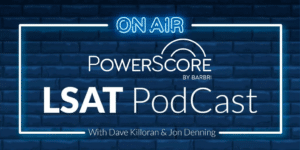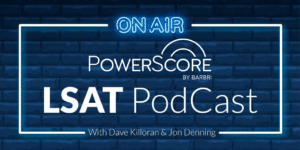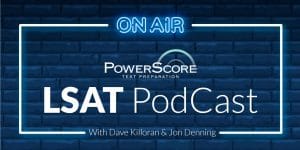Episode 170 contains the full June 2025 LSAT breakdown, both international and domestic, where Dave and Jon outline every scored and experimental section in use all week, an analysis of how their latest Crystal Ball predictions turned out, and the scoring scales for each test format seen. Don’t miss this comprehensive review of one of the biggest tests of the year! … [Read more...]
Podcast Episode 166: LSAT Faceoff: Dave and Jon Debate Five Common Test Concerns
In Episode 166, Dave and Jon go head-to-head on five of the most contentious issues that often divide LSAT students and prep providers, serving up their unique—and at times opposing—perspectives on these hot-button topics. Tune in to hear them debate everything from whether to read the stimulus or question stem first, when and why you should cancel your score, the value of diagramming, their ideal pre-test routine, and even the utility of the … [Read more...]
Podcast Episode 162: Principle Questions
In Episode 162, Dave and Jon tackle one of the trickiest concepts on the LSAT: Principle Questions. Tune in to hear them break down this common and confusing question type, as they explore specific examples and apply solution strategies that will help you conquer every form of this notoriously tough idea. … [Read more...]
Podcast Episode 161: November 2024 LSAT Recap
The last and largest LSAT of 2024 is finally over, meaning Jon and Dave are free and clear to tell you all about it! In Episode 161 they cover the November test start to finish, discussing the record number of scored and experimental sections used, the relative difficulty of everything given, their expectations for the numerous scoring scales, and—to top it all off—the accuracy of the predictions from their latest Crystal Ball/Miniball webinars … [Read more...]
Podcast Episode 147: February 2024 LSAT Recap
The February 2024 LSAT is officially over, giving Dave and Jon license to reveal everything you need to know about it. Tune in as they outline the scored and experimental sections used, general impressions of difficulty, and, as always, their scoring scale predictions for every section combination!Episode Timestamps0:00–Intro3:00–LSAT World7:00–Upcoming … [Read more...]
How Will The New LSAT Logical Reasoning Section Look In August 2024 and Beyond?
The LSAT Is ChangingIf you haven’t heard, Logic Games was removed from the LSAT starting in August 2024! It was replaced by a second Logical Reasoning (LR) section. So, Logical Reasoning is now 67% of the scored portion of the LSAT going forward. Will Logical Reasoning Stay The Same On The New LSAT? The main question students have asked is, “How will LR change on the new test?” While LSAC hasn’t released any specific section info, we know … [Read more...]
Podcast Episode 146: January 2024 LSAT Recap
The January 2024 LSAT proved a colossal kickoff to the year, with roughly 20,000 people testing over four full days! And as always, Jon and Dave tracked every minute of it and have the full recap: from the domestic tests to the internationals, they cover every section breaking down what was scored and what was experimental, the origins of each reuse (including the accuracy of their latest Crystal Ball), and the expected curves based on the … [Read more...]
Podcast Episode 143: November 2023 LSAT Recap
The last LSAT of 2023 has wrapped, and Dave and Jon have all the details! Tune in as they cover the November test week from start to finish, discussing the many scored and experimental sections, the relative difficulty of everything presented, their expectations for the various scoring scales, and—to top it all off—the accuracy of their predictions from their latest Crystal Ball webinar (spoiler: nailed it again).Episode … [Read more...]
Podcast Episode 130: April 2023 LSAT Recap
With the April 2023 LSAT finally behind us, Jon and Dave are checking in with all the details! In this episode they break down the April LSAT, reviewing its source tests and how well they match the Crystal Ball predictions, highlighting the most notable elements that featured each day, and finally offering a section-by-section scale matrix to help you determine the exact curve for your particular exam. Register for the upcoming Crystal Ball: … [Read more...]
Podcast Episode 126: January 2023 LSAT Recap
With the first LSAT of 2023 officially over, Jon and Dave are blazing into the new year with a full test recap! Tune in to hear them deconstruct the January LSAT, explaining what was scored and what was experimental, the relative difficulty of each scored section, and their 155-170 curve predictions for every content combination. They also discuss their latest Crystal Ball forecasts, examining just how accurate they were for January, and what … [Read more...]
Podcast Episode 122: November 2022 LSAT Recap
The November LSAT—and with it the 2022 testing year—has officially wrapped! And that means Jon and Dave are on the scene with everything you need to know, highlighting the exam’s scored vs experimental content, explaining difficulty section by section, and finally examining every possible combination to predict a scoring scale for each test taker. If you tested in November you won’t want to miss this! … [Read more...]
Podcast Episode 120: October 2022 LSAT Recap
The October LSAT was not only the biggest test of 2022 enrollment-wise, it also included the most scored section combinations and some of the toughest LG and RC content that we’ve seen all year! But as always, Jon and Dave are here to cut through the confusion, clarifying what was real, the standout moments of difficulty, and, above all, how it all fit together to produce a surprisingly-wide range of scoring scales. … [Read more...]
Podcast Episode 103: February 2022 LSAT Recap
The February 2022 LSAT is officially over, which means Dave and Jon are in the clear to reveal everything you need to know about it! In Episode 103 they outline the scored and experimental sections used, general impressions of difficulty, and, as always, their scoring scale predictions for every section combination. Don't miss it! … [Read more...]
Podcast Episode 96: The LSAT Logical Reasoning Knowledge Test
Join Jon and Dave as they present the ultimate Logical Reasoning Knowledge Test: 20 questions covering the entirety of the LR section, each designed to measure your grasp on key concepts and fundamental principles. They begin with the 20-question quiz, then follow it up with detailed explanations of each item, explaining precisely how you should have answered and what any missteps tell you about your current LR skills. This is one of the most … [Read more...]




